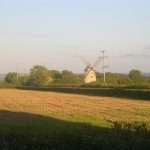Naming the wind
Living on a road that led to a windmill, it was natural to expect that the wind would blow strongly. Sometimes it did, sometimes there were gales, but gales were not of much use to a mill, what it needed was a persistent wind, a wind of a consistent strength, and it is the persistent wind that remains in the memory. The mournful sound it generated as it blew through electric wires evokes a sense of grey skies, dark days and rural isolation.
The wind has a surreptitious power to make its presence felt; the warmth of summer sunshine nullified; a shower transformed into driving rain; a snowstorm strengthened to a blizzard. Being with a friend in a small boat on Galway’s Lough Corrib one summer afternoon, the moment was changed as a sudden gust announced the arrival of a violent squall that threatened to capsize the boat. He muttered something about the fairies; it wasn’t the fairies, it was a straightforward meteorological phenomenon.
Much as the wind could play havoc with life in rural England, it was never so persistent that its presence in particular localities merited a name.
In France, where, admittedly, even the motorways have more than impersonal numbers, there are winds that blow with such strength and consistency that they have their own names.
The Mistral is the most famous. Travelling south along the Rhone valley one summer, there was a forcible sense of its presence; it was hard to imagine what it might be like in the winter. It is said to blow for weeks at a time and there are tales of people being driven mad by the noise it constantly generated and by having each day to deal with its strength.
At the eastern end of the Pyrenees the wind is called the Tramontane; it blows from the north-west and is claimed to clear the clouds from an area that claims more sunshine hours than the Riviera.
It may clear clouds, but seems to bring plenty more in their stead. Nowhere in the brochure is there mention of the noise it creates, making the background noise to a walk around a harbour sound like a flight of banshees as the wind blew constantly through the rigging of boats lying at their moorings.
Sitting in a caravan as darkness falls on a French spring evening, the whole van seems to move as the gusts rise and fall, the sounds from outside are of creeks and rattles and of the wind rushing through the leaves of the trees that have established themselves in the rocky Mediterranean soil. Whatever temperature the thermometer indicated during the day, no-one ventured out without being well-wrapped.
The wind has the quality of that which blew down our road in childhood days; all that is needed is a mill.



Comments
Naming the wind — No Comments
HTML tags allowed in your comment: <a href="" title=""> <abbr title=""> <acronym title=""> <b> <blockquote cite=""> <cite> <code> <del datetime=""> <em> <i> <q cite=""> <s> <strike> <strong>